一般将来时2
一般将来时态精讲
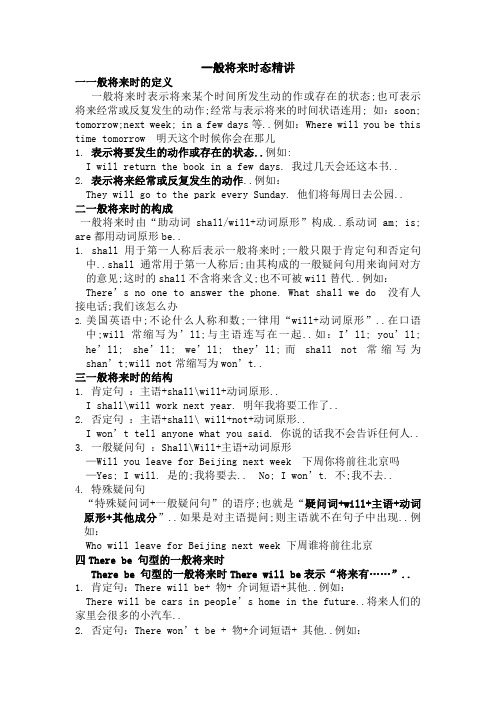
一般将来时态精讲一一般将来时的定义一般将来时表示将来某个时间所发生动的作或存在的状态;也可表示将来经常或反复发生的动作;经常与表示将来的时间状语连用; 如:soon; tomorrow;next week; in a few days等..例如:Where will you be this time tomorrow 明天这个时候你会在那儿1. 表示将要发生的动作或存在的状态..例如:I will return the book in a few days. 我过几天会还这本书..2. 表示将来经常或反复发生的动作..例如:They will go to the park every Sunday. 他们将每周日去公园..二一般将来时的构成一般将来时由“助动词shall/will+动词原形”构成..系动词am; is; are都用动词原形be..1. shall用于第一人称后表示一般将来时;一般只限于肯定句和否定句中..shall通常用于第一人称后;由其构成的一般疑问句用来询问对方的意见;这时的shall不含将来含义;也不可被will替代..例如:There’s no one to answer the phone. What shall we do 没有人接电话;我们该怎么办2.美国英语中;不论什么人称和数;一律用“will+动词原形”..在口语中;will常缩写为’ll;与主语连写在一起..如:I’ll; you’ll; he’ll; she’ll; we’ll; they’ll;而shall not常缩写为shan’t;will not常缩写为won’t..三一般将来时的结构1. 肯定句:主语+shall\will+动词原形..I shall\will work next year. 明年我将要工作了..2. 否定句:主语+shall\ will+not+动词原形..I won’t tell anyone what you said. 你说的话我不会告诉任何人..3. 一般疑问句:Shall\Will+主语+动词原形—Will you leave for Beijing next week 下周你将前往北京吗—Yes; I will. 是的;我将要去.. No; I won’t. 不;我不去..4. 特殊疑问句“特殊疑问词+一般疑问句”的语序;也就是“疑问词+will+主语+动词原形+其他成分”..如果是对主语提问;则主语就不在句子中出现..例如:Who will leave for Beijing next week 下周谁将前往北京四There be 句型的一般将来时There be 句型的一般将来时There will be表示“将来有……”.. 1. 肯定句:There will be+ 物+ 介词短语+其他..例如:There will be cars in people’s home in the future..将来人们的家里会很多的小汽车..2. 否定句:There won’t be + 物+介词短语+ 其他..例如:There won’t be any trees in this place in two years.两年后这个地方就不会有树了..3. 疑问句:Will there be +物+介词短语+其他例如:—Will there be less pollution 将来会有更少的污染吗—Yes; there will.是的;会的..—No; there w on’t. 不;不会..五be going to 表示将来1.用来表示按计划或安排要发生的动作We are going to have a class meeting this afternoon.今天下午我们打算开班会..2.表示推测将要或肯定会发生的动作;有“准备;打算”的意思..含有be going to 结构的句子中往往有表示将来的时间状语..例如:Look at the black clouds. It's going to rain.看那些乌云;快要下雨了..结构:肯定句:主语 + beam;is;are + going to do sth.否定句:主语 + beam;is;are+ not + going to do sth.疑问句:Beam;is;are+ 主语 + going to do sthYes; 主语+ am/is/are. / No; 主语+ isn't/aren't. / No; I'm not.They are going to see the car factory next week. 肯定句They are not going to see the car factory next week. 否定句-Are they going to see the car factory next week-Yes; they are. No; they aren't. 一般疑问句及其回答注意:There is / are going to be... 注意句型中going to 后面的be不能改为have.. 常用来表示将有某事发生..例如:There is going to be a football match next Saturday in our school.下周六我们学校将有一场足球比赛..六come; go; leave; arrive;take等表示位置移动的动词常用现在进行时表示将要发生的动作;它们很少与be going to 结构连用..例如:Miss Sun is coming tonight.今晚孙小姐要来..七be going to 和will的区别1.will表示说话人认为、相信、希望或假定要发生的事;不含任何具体的时间;可以指遥远的将来;而be going to 指有迹象表明某事即将发生或肯定发生;通常指很快就要发生的事情..2.2. be gong to 和will均可表示意图;但事先考虑过的意图用be going to;不是事先考虑过的意图用will..一般将来时练习一、单项选择1. There __________ a meeting tomorrow afternoon.A. will be going toB. will going to beC. is goingto be D. will go to be2. Charlie ________ here next month.A. isn’t workingB. doesn’t workingC. isn’t goingto working D. won’t work3. He ________ very busy this week; he ________ free next week.A. will be; isB. is; isC. will be; will beD.is; will be4. There ________ a dolphin show in the zoo tomorrow evening.A. wasB. is going to haveC. will haveD. is going to be5. –________ you ________ free tomorrow – No. I ________free the day aftertomorrow.A. Are; going to; willB. Are; going to be; willC. Are; going to; will beD. Are; going to be; willbe6. Mother ________ me a nice present on my next birthday.A. will givesB. will giveC. givesD. give7. –Shall I buy a cup of tea for you –________. 不;不要..A. No; you won’t.B. No; you aren’t.C. No; pleasedon’t. D. No; please.8. –Where is the morning paper –I ________ it foryou at once.A. getB. am gettingC. to getD.will get9. ________ a concert next SaturdayA. There will beB. Will there beC. There canbe D. There are10. If they come; we ________ a meeting.A. haveB. will haveC. hadD.would have11. He ________ her a beautiful hat on her next birthday.A. givesB. gaveC. will givingD.is going to give12. He ________ to us as soon as he gets there.A. writesB. has writtenC. will writeD. wrote13. He ________ in three days.A. coming backB. came backC. will come backD.is going to coming back14. If it ________ tomorrow; we’ll go roller-skating.A. isn’t rainB. won’t rainC. doesn’t rainD. do esn’t fine15. – Will his parents go to see the Terra Cotta Warriorstomorrow– No; ________ 不去.A. they willn’t.B. they won’t.C. they aren’t.D. they don’t.16. Who ________ we ________ swimming with tomorrow afternoonA. will; goB. do; goC. will; goingD.shall; go17. We ________ the work this way next time.A. doB. will doC. going to doD. willdoing18. Tomorrow he ________ a kite in the open air first; and then________ boating in thepark.A. will fly; will goB. will fly; goesC. is going to fly;will goes D. flies; will go19. The day after tomorrow they ________ a volleyball match.A. will watchingB. watchesC. is watchingD. is going to watch20. There ________ a birthday party this Sunday.A. shall beB. will beC. shall going to beD.will going to be21. They ________ an English evening next Sunday.A. are havingB. are going to haveC. will havingD. is going to have22. ________ you ________ free next SundayA. Will; areB. Will; beC. Do; beD. Are; be23. He ________ there at ten tomorrow morning.A. willB. isC. will beD. be24. ________ your brother ________ a magazine from the libraryA. Are; going to borrowB. Is; going to borrowC. Will; borrowsD. Are; going to borrows25. –Shall I come again tomorrow afternoon –________好的.A. Yes; pleaseB. Yes; you will.C. No; please.D.No; you won’t.26. It ________ the year of the horse next year.A. is going to beB. is going toC. will beD. will is27. ________ open the windowA. Will you pleaseB. Please will youC. You pleaseD. Do you28. –Let’s go out to play football; shall we – OK.I ________.A. will comingB. be going to comeC. comeD.am coming29. It ________ us a long time to learn English well.A. takesB. will takeC. spendsD. willspend30. The train ____ at 11.A. going to arriveB. will be arriveC. is going toD. is arriving二、动词填空1. I ______leavein a minute. I ______finishall my work before I ______ leave.2. —How long _____ you _____studyin our country—I _____planto be here for about one more year.—I _____hopeto visit the other parts of your country.—What ______ you ______doafter you ______leavehere—I ______returnhome and ______geta job.3. I ______betired. I ___________goto bed early tonight.4. Mary’s birthday is next Monday; her mother __________givehera present.5. It is very cold these days. It ___________snowsoon.6. —_____ you _____behere this Saturday —No. I ___________visitmy teacher.7. —______ I ______getyou a copy of today’s newspaper —Thank you.8. I am afraid there ______be a meeting this afternoon. I can’t join you.9. Mike ___________ not ; believethis until he ______seeit with hisown eyes.10. Most of us don’t think their team ______win.三、句型转换..1. People in the north often go skating in winter. next winter _______________________________________________________________ _______________3.There are two cinemas in that town. next year_______________________________________________________________ _______________4.He comes back late.in two days_______________________________________________________________ _______________5.She is a conductor of a train.soon_______________________________________________________________ _______________6.Li Ming is ten years old.next year_______________________________________________________________ _______________7.I sometimes write to my mother in the evening.tonight_______________________________________________________________ _______________8.He went there by plane.some day next year______________________________________________________________________________9.China is a modern and strong country.in twenty years______________________________________________________________________________10.Do you study hard from now on______________________________________________________________________________11.She didn’t speak English at the meeting.before long______________________________________________________________________________一般将来时态答案一、单项选择..1. C2. D3. D4.D5. D6. B7. C8. D9. B 10. B 11. D 12. C 13. C 14. C 15. B 16.D17. B 18. A 19. D 20. B 21. B 22. B 23. C 24.B25. A 26. A 27. A 28. D 29. B 30. D二、动词填空..1. am leaving ; will finish ; leave2. will ; study ; plan ; hope ; will ; do ; leave ; will return ;get3. am ; will4. will give5. will snow6. Will ; be ; will visit7. Shall ; get8. will be 9. won’t believe ; sees 10. will win三、句型转换..1. People in the north will go skating next winter.2. There will be two cinemas in that town next year.3. He will come back late in two days.4. She will be a conductor of a train soon.5. Li Ming will be ten years old next year.6. I will write to my mother tonight.7. He will go there by plane some day next year.8. China will be a modern and strong country in twenty years.9. Will you study hard from now on10. She won’t speak English at the meeting before long.。
英语一般将来时的用法
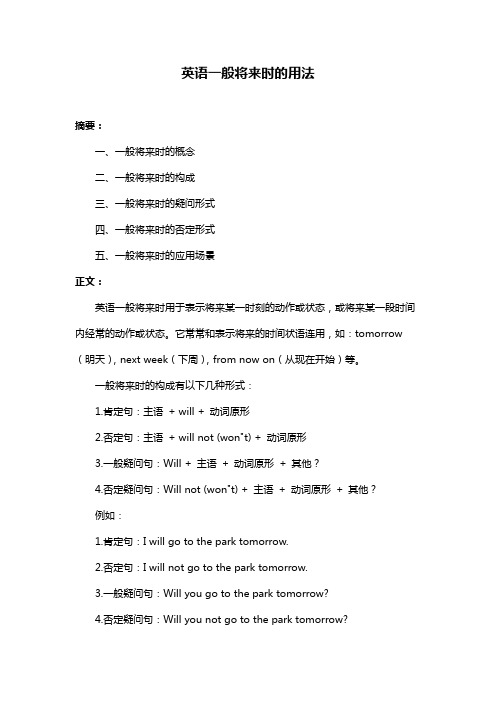
英语一般将来时的用法
摘要:
一、一般将来时的概念
二、一般将来时的构成
三、一般将来时的疑问形式
四、一般将来时的否定形式
五、一般将来时的应用场景
正文:
英语一般将来时用于表示将来某一时刻的动作或状态,或将来某一段时间内经常的动作或状态。
它常常和表示将来的时间状语连用,如:tomorrow (明天),next week(下周),from now on(从现在开始)等。
一般将来时的构成有以下几种形式:
1.肯定句:主语+ will + 动词原形
2.否定句:主语+ will not (won"t) + 动词原形
3.一般疑问句:Will + 主语+ 动词原形+ 其他?
4.否定疑问句:Will not (won"t) + 主语+ 动词原形+ 其他?
例如:
1.肯定句:I will go to the park tomorrow.
2.否定句:I will not go to the park tomorrow.
3.一般疑问句:Will you go to the park tomorrow?
4.否定疑问句:Will you not go to the park tomorrow?
一般将来时在实际应用中非常广泛,可以用于描述未来的计划、预期、愿望等。
一般将来时动词规则

一般将来时动词规则一般将来时是英语语法中十分基础的一种时态,常常用于表达将来发生的动作或状态。
作为英语学习的重要部分,掌握一般将来时动词规则显得尤为重要。
一、动词规则的概述一般将来时动词规则主要包括两种形式:will/do not 和 be going to/ am not going to。
其中,will/do not表示下一时刻或不确定的未来行动;be going to/am not going to表示有预谋或依据的未来行动。
二、will/do not的用法1. 表示将来行动或状态,如:I will go to the store tomorrow.(我明天去商店。
)2. 表示预测或猜测,如:I think it will be sunny tomorrow.(我认为明天会是晴天。
)3. 表示意愿、请求或建议,如:Will you help me with my homework?(你能帮我做作业吗?)4. 表示承诺和谈判,如:I will pay you back tomorrow.(我明天会付给你。
)5. 表示习惯性的行动,如: I will often eat at this restaurant.(我经常在这家餐厅吃饭。
)二、be going to/am not going to的用法1. 表示将要发生的已经有预谋或计划的未来行动,如:I am going to study English next year.(我明年将学习英语。
)2. 表示可能的未来行动或情况,如:The clouds are getting dark. It looks like it is going to rain.(云层变得很暗,看着像要下雨了。
)3. 表示即将完成的事情,如:I am going to finish my work before dinner.(我会在晚饭前完成我的工作。
)4. 表示打算不做某事,如:I am not going to eat this cake. It has gone bad.(我不打算吃这个蛋糕了,它已经变质了。
动词时态一般将来时的用法

动词时态一般将来时的用法动词时态包含了多种不同的形式,每种形式都传达了特定的时间信息。
在英语中,一般将来时是用来表达将来发生的动作、事件或状态的。
本文将详细介绍一般将来时的用法,并提供一些例句来帮助读者更好地理解。
一、一般将来时的定义一般将来时是用来表达明确的将来发生的动作或状态。
通常使用的助动词是will或shall,根据主语的不同而定。
二、一般将来时的构成1. 肯定句结构:主语 + will + 动词原形例如:- I will go shopping tomorrow.- He will travel to Europe next week.2. 否定句结构:主语 + will + not + 动词原形,或主语 + won't + 动词原形例如:- She will not visit her grandparents this weekend.- They won't attend the party.3. 疑问句结构:Will + 主语 + 动词原形?例如:- Will you join us for dinner?- Will they arrive on time?三、一般将来时的用法1. 表达自愿或意愿一般将来时常常用来表达主观上的决定、打算或愿望。
例如:- I will help you with your project.- He will volunteer at the local charity organization.2. 表示未来的计划或安排一般将来时可用于描述预定的时间表或安排。
例如:- We will have a meeting at 9am tomorrow.- They will arrive at the airport in the evening.3. 表示预测或推测有时,我们可以根据现有的证据或情况,使用一般将来时来推测未来可能发生的事情。
(完整)初中英语一般将来时(2)

(完整)初中英语⼀般将来时(2)⼀般将来时Step1 Review⼀般将来时⼀、概念:表⽰将要发⽣的动作或存在的状态及打算、计划或准备做某事。
句中⼀般有以下时间状语:tomorrow, next day(week, month, year…),soon, the day after tomorrow(后天)等。
⼆、基本结构:①be going to + do;②will+ do.三、否定句:在be动词(am, is, are)后加not或情态动词will后加not成won’t, some改为any, and改为or例如:I’m going to have a picnic this afternoon.→ I’m not going to have a picnic this afternoon.四、⼀般疑问句:be或will提到句⾸,some改为any, and改为or,第⼀⼆⼈称互换。
例如:We are going to go on an outing this weekend. → Are you going to go on an outing this weekend?五、对划线部分提问:⼀般情况,⼀般将来时的对划线部分有三种情况。
1. 问⼈。
Who 例如:I’m going to New York soon. →Who’s going to New York soon.2. 问⼲什么。
What … do.例如:My father is going to watch a race with me this afternoon.→What is your father going to do with you this afternoon.3. 问什么时候。
When.例如:She’s going to go to bed at nine. →When is she going to bed?六、同义句:be going to = willI am going to go swimming tomorrow(明天). = I will go swimming tomorrow. Step2 语法讲解最基本的结构:will + 动词原形【例句1】I/We/You/He/She/They will visit the museum tomorrow.明天我/我们/你/他/她/他们要去参观博物馆。
小升初(全国通用)英语时态复习 一般将来时2
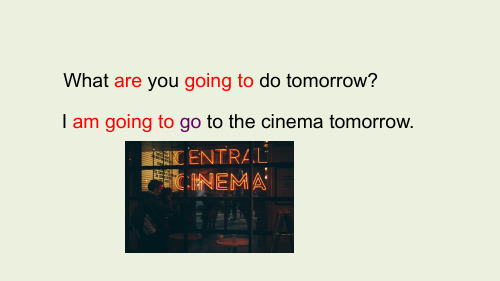
go to bed
一般将来时
一般将来时的功能
1.表示将要发生的事情。
如:I will play football this weekend. 我这个周末要去踢足球。
2.表示打算、计划或预备做某事。
如:I am going to play football this weekend. 我打算这个周末踢足球。
Yes, I am. / No, I’m not. Yes, I will. / No, I won’t.
❖ 一般将来时的句式变化 ❖ 特殊疑问句: ❖ I am going to play football tomorrow. ❖ I will play football tomorrow. ❖ When are you going to play football? ❖ When will you play football?
When is she going to go shopping?
eg: They are going to dance tonight. They aren’t going to dance tonight. Are they going to dance tonight? Yes, they are. No, they aren’t. What are they going to do tonight? When are you going to dance?
结构:主语+be动词+going to +动词原形+时间副词.
主语+ will+ 动词原形+时间副词.
例如:Jim is going to play football. Jim will play football.
Long long ago
一般将来时知识点总结(2)
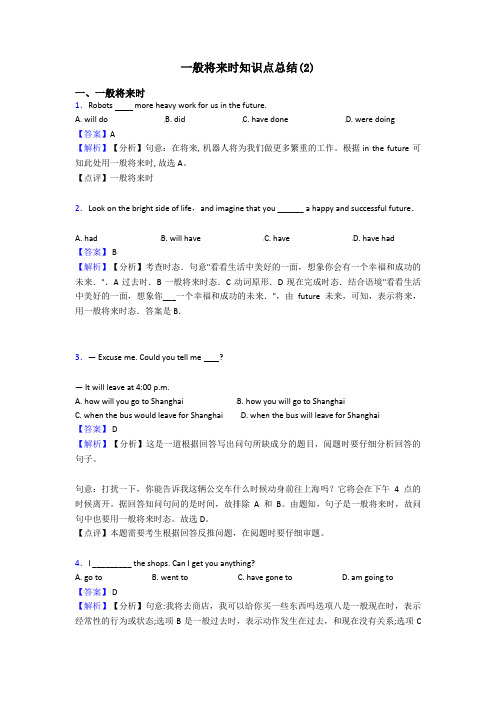
一般将来时知识点总结(2)一、一般将来时1.Robots more heavy work for us in the future.A. will doB. didC. have doneD. were doing【答案】A【解析】【分析】句意:在将来, 机器人将为我们做更多繁重的工作。
根据in the future 可知此处用一般将来时, 故选A。
【点评】一般将来时2.Look on the bright side of life,and imagine that you ______ a happy and successful future.A. hadB. will haveC. haveD. have had【答案】 B【解析】【分析】考查时态.句意"看看生活中美好的一面,想象你会有一个幸福和成功的未来.".A过去时.B一般将来时态.C动词原形.D现在完成时态.结合语境"看看生活中美好的一面,想象你___一个幸福和成功的未来.",由future未来,可知,表示将来,用一般将来时态.答案是B.3.— Excuse me. Could you tell me ?— It will leave at 4:00 p.m.A. how will you go to ShanghaiB. how you will go to ShanghaiC. when the bus would leave for ShanghaiD. when the bus will leave for Shanghai【答案】 D【解析】【分析】这是一道根据回答写出问句所缺成分的题目,阅题时要仔细分析回答的句子。
句意:打扰一下,你能告诉我这辆公交车什么时候动身前往上海吗?它将会在下午4点的时候离开。
据回答知问句问的是时间,故排除A和B。
由题知,句子是一般将来时,故问句中也要用一般将来时态。
一般将来时的几种语法形式
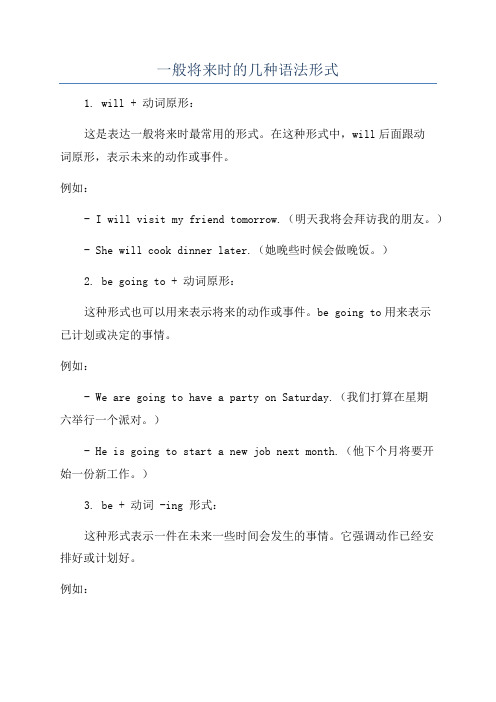
一般将来时的几种语法形式1. will + 动词原形:这是表达一般将来时最常用的形式。
在这种形式中,will后面跟动词原形,表示未来的动作或事件。
例如:- I will visit my friend tomorrow.(明天我将会拜访我的朋友。
)- She will cook dinner later.(她晚些时候会做晚饭。
)2. be going to + 动词原形:这种形式也可以用来表示将来的动作或事件。
be going to用来表示已计划或决定的事情。
例如:- We are going to have a party on Saturday.(我们打算在星期六举行一个派对。
)- He is going to start a new job next month.(他下个月将要开始一份新工作。
)3. be + 动词 -ing 形式:这种形式表示一件在未来一些时间会发生的事情。
它强调动作已经安排好或计划好。
例如:- They are traveling to Paris next week.(他们下周去巴黎旅行。
)- I am meeting my friends for lunch tomorrow.(明天我将与朋友们见面吃午饭。
)4. be about to + 动词原形:这种形式表示即将发生的事情,比如在不远的将来要发生的事情。
例如:- The movie is about to start.(电影即将开始。
)- She is about to graduate from university.(她即将大学毕业。
)5. be to + 动词原形:这种形式常用于官方通知、计划或安排。
它表示将要发生的事情是按照提前安排的程序进行。
例如:- The meeting is to be held tomorrow.(会议定于明天举行。
)- The train is to arrive at 9 o'clock.(火车将于9点钟到达。
初中英语一般将来时态讲解
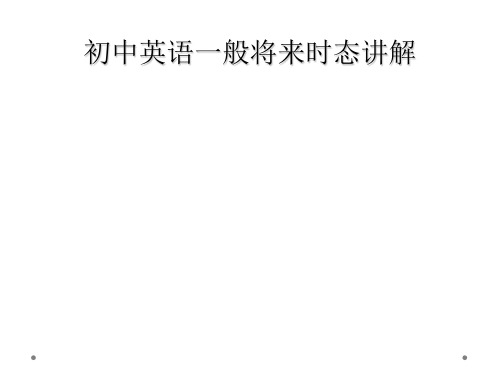
2、否定式
I shall not go to Europe next week. 下周我将不会去欧洲。 Lisa won’t be back in a few days. 丽莎几天后还不会回来。
3、一般疑问式
A: Will you go to Europe next week B: Yes, I will. B: No, I won’t. A: Will Lisa be back in a few days B: Yes, she will. B: No, she won’t.
不久后 before long a moment later
将来 in the future 明天早上 tomorrow morning
一小时后 one hour later in an hour
• be going to+动词原形
1、表示现在的意图,即打算在最近或 不久的将来做某事。
We are going to ask him. 我们打算问他。 What are you going to do tonight 你今晚打算做什么?
表示将要发生的动作或情况。如:
明天将会下雨。
It will rain tomorrow.
他将在下周一到达。
He will arrive next Monday.
我将永远不会忘记它。
I shall never forget it.
下次 next time 明天 tomorrow 明年 next year 今天下午 this afternoon 后天 the day after tomorrow
2、表示现在已有迹象表明即将 发生某事。
Look, it’s going to rain.
一般将来时动词变化规则

一般将来时动词变化规则一般将来时是英语中用来表示将来发生的动作或存在的状态的时态。
在一般将来时中,动词的变化规则如下:1. 一般动词在一般将来时中,一般动词的变化规则如下:主语 + will + 动词原形例如:- I will go to the park tomorrow.- They will buy a new car next month.2. 助动词 do在一般将来时中,助动词 do 的变化规则如下:主语 + will + do + 动词原形例如:- He will do his homework later.- We will do the cleaning tomorrow.3. 助动词 be在一般将来时中,助动词 be 的变化规则如下:主语 + will + be + 动词-ing 形式例如:- She will be studying abroad next year.- They will be working on a new project.4. 特殊情况在一般将来时中,有一些动词的变化规则略有不同:- can → will be able to- may → will be allowed to- must → will have to- should → will be supposed to例如:- He will be able to swim next summer.- She will be allowed to go to the party.- They will have to finish the report by tomorrow.- We will be supposed to arrive on time.总结一般将来时是英语中表示将来动作或状态的时态,动词的变化规则包括使用助动词 will,助动词 do或助动词 be,以及特殊情况下的变化规则。
一般将来时时态用法讲解
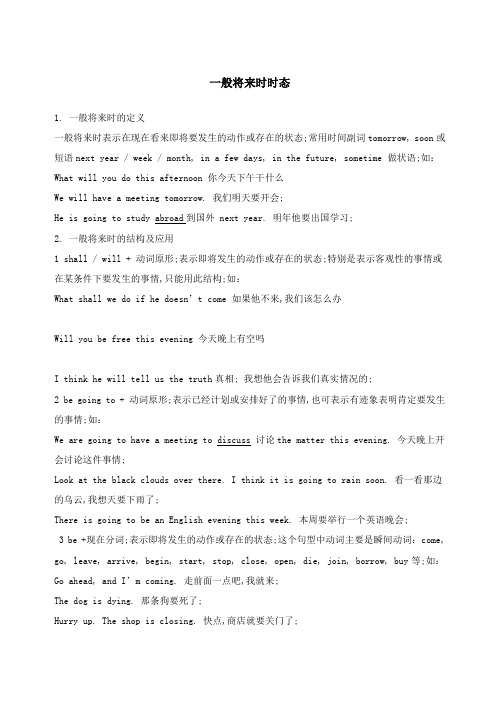
一般将来时时态1. 一般将来时的定义一般将来时表示在现在看来即将要发生的动作或存在的状态;常用时间副词tomorrow, soon或短语next year / week / month, in a few days, in the future, sometime 做状语;如:What will you do this afternoon 你今天下午干什么We will have a meeting tomorrow. 我们明天要开会;He is going to study abroad到国外 next year. 明年他要出国学习;2. 一般将来时的结构及应用1 shall / will + 动词原形;表示即将发生的动作或存在的状态;特别是表示客观性的事情或在某条件下要发生的事情,只能用此结构;如:What shall we do if he doesn’t come 如果他不来,我们该怎么办Will you be free this evening 今天晚上有空吗I think he will tell us the truth真相; 我想他会告诉我们真实情况的;2 be going to + 动词原形;表示已经计划或安排好了的事情,也可表示有迹象表明肯定要发生的事情;如:We are going to have a meeting to discuss 讨论the matter this evening. 今天晚上开会讨论这件事情;Look at the black clouds over there. I think it is going to rain soon. 看一看那边的乌云,我想天要下雨了;There is going to be an English evening this week. 本周要举行一个英语晚会;3 be +现在分词;表示即将发生的动作或存在的状态;这个句型中动词主要是瞬间动词:come, go, leave, arrive, begin, start, stop, close, open, die, join, borrow, buy等;如:Go ahead, and I’m coming. 走前面一点吧,我就来;The dog is dying. 那条狗要死了;Hurry up. The shop is closing. 快点,商店就要关门了;4 一般现在时;表示一种严格按照计划进行的动作;比方说,上课、飞机起飞、火车离站等;如:Don’t hurry. The meeting starts at a quarter past eight. 不要匆忙,回忆八点过一刻开始;The bus goes back at four thirty. 汽车四点返回;巩固练习:一、用所给动词的适当形式填空1.Li Lei tells me he _________________visitthe Great Wall长城this weekend.2.My mother _________________buyme a pair of new trousers tomorrow.3.She says she _________________leavesoon.4.We _________________go skating if it doesn’t rain next Sunday.5.There _________________bean English evening next week.6.Think over, and you _________________geta good idea.7.——___________Jim ___________havea picnic next Monday——-No, he __________.8.I _________________missyou after you leave here.9.Who _________________teachyou English next year10.He _________________ be back in three hours.11.Look at these clouds. It ___________________ rain.二、改错:每处划线中有错误,在题后改正1.He will sing anddancesfor us tomorrow.2.Are you going to swim ------Yes, Iwill.3.He will help Jim with his Englishevery day.4.Will her sistersingsa song for me tomorrow5.They willn’t plant trees next week.6.Are they going toplaysbasketball tomorrow7.Willwe go to visit the factory tomorrow8.Paulwill be going tomake dumplings for Emma.9.Are the boys going to the Great Wall next month ------Yes, theywill.三、句型转换:Jimis going to play footballtomorrow.Marywill clean the windowsnext week.否定句:____________________________ ______________________________一般疑问句:_____________________________ ______________________________两回答:___________________________ _____________________________特殊疑问句:______________________ _____________________________四、选择题1. —Are you going to _______ our English team—Yes, I am.A. take part inB. joinC. took part inD. joined2. Xu Xia and her teammates are _______ the USA next week.A. leaving forB. leave forC. leaveD. left3. There _______ an English party in our class next week.A. is going to haveB. is going to beC. will haveD. Have4. If it _______ tomorrow, we will go to the park.A. isn’t rainB. don’t rainC. doesn’t rainD. won’t rain5. There ______ a football match next week. Shall we go and watch itA. will haveB. hasC. haveD. will be“Would you mind doing…”句型透视mind用作动词时,习惯后接动名词短语作宾语,而不接动词不定式,常用于Would you mind doing…句型中,具体用法是:1. “Would you mind doing…”句型常用于表示请求,意思是“请你做……你是否介意、请你做……好吗”,是一种比较客气的表达方式;如:Would you mind turning off the light in the room请你把房间里的灯关掉好吗如果要表示“请你不要做……你是否介意、请你不要做……好吗”,只需要在doing前面加上not.如:Would you mind not standing in front of me请你不要站在我的前面好吗2. 如果同意,表示不介意时,可用如下用语来表达:Certainly/Of course not./Not at all./No, not at all;如果不同意,表示介意时,常用“Sorry/I‘m sorry.”对不起及陈述某种理由来表示拒绝或反对;如:—Would you mind going to the movies this evening今晚去看电影好吗—I‘m sorry. But I haven’t finished my homework yet.对不起,我的作业还没有完成;学习时还要注意:1.“Would you mind doing…”句型中的would也可用do代替,但语气较生硬,不如用would客气;2.“Would you mind doing…”句型中的逻辑主语只能是谈话的对方you.如果想要对方允许自己做某事,可用“Would you mind my doing…”句型,如:Would you mind my smoking here你介意我在这里吸烟吗巩固练习:一、用下面提供的短语完成句子;1. help me wash my clothesWould you mind ______________________________2. give her a cup of teaWould you mind _______________________________3. help him mend his carDo you have _______________________________4. walk on the roadWould you mind _______________________________ on the road二、选择题1. —Would you mind _______ us in the game—Not at all.A. joiningB. joinC. join inD. joining in2. —Would you like to climb mountains with me this Sunday—I’d love to. But I _______ play table tennis against Class Three.A. am goingB. am going toC. amD. going to3. —Would you mind _______here—I’m sorry about that. I’ll go somewhere else.A. no smokingB. not smokingC. no smokeD. not smoke1. had better 的基本用法特点其意为“最好”、“应该”,后接动词原形,与情态动词should用法相似,其中的had 通常缩略为’d:You’d better get some sleep.你最好去睡一会儿;Wego before it rains.我们最好在下雨前就去;2. had better如何构成否定式和疑问式构成否定式时,通常将not置于had better之后而不是had之后;而构成疑问式时,则通常将had而不是had better置于主语之前:I’d better not disturb him.我最好别去打扰他;What had we better do我们最好怎么办练习题1. —I’m afraid you have a cold. You’d better go to see a doctor.—_______A. No, I have no time.B. That’s a good idea.C. It’s very kind of you.D. I’m sorry to hear that.2. —I’m fat. What should I do—You’d better eat _______ meat and _______ fruits.A. less; moreB. less; lessC. more; lessD. more; more3. You had better ask your brother _______ playing computer games. It’s badfor him.A. to give upB. not to give upC. to give it upD. not give it up4. —I have a stomachache. What should I do—You _______ drink sweet water and _______ eat sweet food.A. had better not; shouldn’tB. should; had betterC. had better; had betterD. shouldn’t; should5. —I have a toothache.—You should _______.A. drink lots of waterB. take a restC. see a dentistD. have a good sleep情态动词的基本用法归纳情态动词有can could, may might, must, have to, shall should, will would, need needed, ought to等; 情态动词无人称和数的变化;不能单独使用,必须与其后的动词原形构成谓语;一、 can, could1. 表示能力体力、知识、技能;Can you lift this heavy box体力Mary can speak three languages.知识Can you skate技能2.表示请求和允许;-----Can I go now----- Yes, you can. / No, you can’t.此时可与may互换;在疑问句中还可用could,might代替,不是过去式,只是语气更委婉,不能用于肯定句和答语中;---- Could I come to see you tomorrow---- Yes, you can. No, I’m afraid not.3.表示客观可能性客观原因形成的能力;They’ve changed the timetable, so we can go by bus instead.This hall can hold 500 people at least.4.表示推测惊讶、怀疑、不相信的态度,用于疑问句、否定句和感叹句中;Can this be trueThis can’t be done by him.How can this be true二、 may, might1. 表示请求和允许;might比 may语气更委婉,而不是过去式;否定回答时可用can’t或mustn’t,表示“不可以,禁止”;----Might/ May I smoke in this room---- No, you mustn’t.---- May/Might I take this book out of the room---- Yes, you can. No, you can’t / mustn’t.用May I...征徇对方许可时比较正式和客气,而用Can I...在口语中更常见;2.用于祈使句,表示祝愿;May you succeed3. 表示推测、可能性不用于疑问句;might不是过去式,它所表示的可能性比may小;1.He may /might be very busy now.2.Your mother may /might not know the truth.三、 must, have to1. 表示必须、必要;You must come in time.在回答引出的问句时,如果是否定的,不能用mustn’t禁止,不准,而用needn’t, don’t have to不必.---- Must we hand in our exercise books today---- Yes, you must.---- No, you don’t have to / you needn’t.2. must是说话人的主观看法, 而have to则强调客观需要;must只有一般现在时, have to 有更多的时态形式;1 he play isn’t interesting, I really must go now.2 I had to work when I was your age.3.表示推测、可能性只用于肯定的陈述句1 You’re Tom’s good friend, so you must know what he lik es best.2 Your mother must be waiting for you now.四、need1.need 作情态动词用时, 常用于疑问句、否定句;在肯定句中一般用must, have to, ought to, should代替;1You needn’t come so early.2 ---- Need I finish the work today---- Yes, you must. / No, you needn’t.2. need作实义动词用时, 有人称、时态和数的变化;而need后面只能接带to的不定式;He needs to finish his homework today.五、 shall, should1.shall 用于第一人称,征求对方的意见;What shall we do this evening2.shall 用于第二、三人称,表示说话人给对方的命令、警告、允诺或威胁;1.You shall fail if you don’t work hard.警告2He shall have the book when I finish it.允诺3He shall be punished.威胁六、 will, would1.表示请求、建议等,would更委婉;Will / Would you pass me the ball, please2..表示意志、愿望和决心;1. I will never do that again.2. They asked him if he would go abroad.3. would表示过去反复发生的动作或某种倾向;would表示过去习惯时比used to正式,且没有“现已无此习惯”的含义;1. During the vacation, he would visit me every other day.2. The wound would not heal.七、 should1.should表示“应该”1. I should help her because she is in trouble.2.表示推测should , 客观推测, must主观推测;1.He must be home by now. 断定他已到家2He ought to/should be home by now.不太肯定3 This is where the oil must be.直爽4This is where the oil ought to/should be.含蓄练习题1. —May I ask you some questions, Dr. Wang—_______A. You’re welcome.B. Sure, go ahead.C. No, I’m busy.D. Yes, you must.2. —Must I take part in the activity—No, you _______. You’re too young. You should look after yourself.A. mustn’tB. don’tC. can’tD. don’t have to3. —May I watch TV, Mom—I’m afrai d you _______.A. should notB. can’tC. must notD. may not4. —Must we keep the window _______ all the time—No, you don’t have to.A. openingB. openedC. to openD. open5. —Must I take the medicine every day—No, you _______.A. mustB. mustn’tC. needn’tD. can’t6. My mother is ill. I _______ stay at home to take care of her.A. canB. mayC. have toD. maybe7. —May I use your dictionary, Lily—Sure, _______.A. go aheadB. you can ask BillC. you can’tD. that’s all right反身代词用法归纳一、反身代词的基本形式反身代词是 oneself根据所指词的人称、性别、单复数等的变化可以有 myself, himself, herself, yourself, itself, ourselves, yourselves, themselves 等形式;二、oneself与himself当one指人时,其相应的反身代词通常用oneself, 在美国英语中也可用himself:One should not praise oneself himself. 一个人不应该自吹自擂;三、反身代词的句法功能:1. 用作同位语加强被修饰词的语气,紧放在被修饰名词后, 或句末:The box itself is not so heavy. 箱子本身并不重;Martin himself attended the sick man. 马丁亲自照顾病人;2. 用作宾语动词或介词的宾语:Take good care of yourself. 照顾好自己;She could not make herself understood. 她不能使别人听懂她的话;The child cried himself to sleep. 孩子哭着哭着睡着了;3. 用作表语The poor boy was myself. 那个可怜的孩子就是我自己;The ones who really want it are ourselves. 真正想要它的是我们自己;1. —He plays basketball so well Who taught _______—He learnt it by _______.A. him; himB. himself; himselfC. him; himselfD. himself; him要求四会的单词名词体育运动team match football tennis baseballskating rowing cycling basketball soccer人物或称谓类person player musician scientist pilotpoliceman policewoman postman fishermanhero grandfather grandmother grandparents物品类basket cup paper gold record brush ring处所类grass theatre/theater museum factory身体健康类body health toothache headache fevercough stomachache illness medicine heart食品饮料类coffee tea candy fruit sugartomato+es potato+es salt watermelon sandwichstrawberry beef biscuit meal时间类age century weekend文化信息类information website Internet dictionaryknowledge message passage culture其他shower fact care advicea piece of advice news pityarticle smoke risk question habitworldwar introduction note smile peacesouth middle taxi answer litter voice score line phone example skillpoint chance suggestion mind sidedream future friendship jump part形容词或副词weak←→strong least ←→most popular←→unpopularhealthy =fit←→ill fat ←→thin dirty←→cleanuseful←→ useless dark←→bright hungry←→ fulldead←→alive cheap ←→expensive=dear true←→ falsecorrect←→ wrong possible ←→impossible quiteexcited /exciting tired/tiringcertainly badly really finally evenfamous mad angry main successful enough terrible serious still funny active modern necessary动词:win cheer row join skate cycledream grow spend jump relaxleave kick pass throw fightenjoy/practice/ finish/ mind +doing sth. advise killinvent become follow hold scorepoint hit hear ring stand feel break record suggest lift boil brushlie cry care check worry causesmoke taste force risk build happen介词against through without off except词组荟萃名词词组table tennis the day after tomorrow day and nightice cream potato chips first aid relay race动词词组cheer...on grow up be good forbe good at=do w ell in←→do badly in take part in keepfit leave for fall ill give sb. a hand shout at sb.do one’s best=try one’s best be angry with talkaboutcome into being stand for have a cold liedownworry about go ahead build sb. up takecare of介词词组及其他for example at least in fact as...aspossible in the futureon the other hand instead of all overat first课本中出现的词组或搭配归纳be able to be sure be interested in see sb.do/doing sthjoin the school rowing team join sb spend ...doing sththe high jump the long jump turn ... into... make sb./sth. +adj. all over the world help sb. dosth play against have funthe most popular sports stop sb from doing sth. such as/for examplehundreds of years the boys’ 800-meter race lots of =a lot ofmake friends with sb. win the first place nexttimelook/ get well/better take one’s advicetake medicine take/have a bath have/take a restfeel like doing sth. go up go outfall down nothing serious stay uphave a good rest do morning/eye exercises tell/ask sbto do sth.give up show sb. sth.= show sth. to sb. too much重句大本营1.—What are you going to do—I’m going to play basketball.2.—Would you like to come and cheer us on—Sure,I’d love to.3.—Which sport do you prefer, swimming or rowing—I prefer rowing.4.—Are you going to join the school rowing team—Yes, I am./ No, I’m not.5.—What’s your favorite sport, ________—Basketball, of course.6.—Who’s your favorite player—LeBron James.7.—What are you going to be when you grow up—I’m going to be a scientist.8.—Why do you like playing soccer—Because it makes him strong and it’s popular all over the world.9.—_______, could you help me=give me a hand, please—Sure.10.—Will you join us—I’d be glad to.11.—Would you mind teaching me—Not at all. You can do it12.—Would you mind not putting your bike here—Sorry. I’ll put it somewhere else.13.—_______, I am sorry for what I said.宾语从句—It’s nothing.14.—Will you take part in the school sports meet—Of course I will.15.—Which sport will you take part in—The boys’ 800-meter race.16.—Hello, is _______ in—Speaking.17.—What shall we take—We’ll take our sp orts clothes and sports shoes.18.—Shall I take my camera—Good idea It’ll be fun19.—When shall we meet—Let’s make it half past six.20.—Where shall we meet—At my house.21.—Hello, _________ You don’t look well. What’s wrong withyou=What’s the matter with you=What is the matter with you—I have a toothache/backache/stomachache/headache/fever.I have the flu.22.—I hope you’ll get well soon.—Thank you.23.—How long have you been like this—Two days./For two days.24.—You’d better take some medicine.—I think I will.25.—How are you feeling today—Not too bad.26.—Staying up late is bad for your health.—Right I must have a good rest.27.—May I ask you some questions, Dr. Li—Sure, go ahead.28.—Must we go to see a doctor at once when we have the flu—Yes, we must./No, we needn’t.we don’t have to.29.—Could I speak to Dr. Li Yuping30.—I’m afraid he is busy right now.—Can I leave a message—Sure, go ahead.其他重要句型1.She spends half an hour exercising in the gym every day.2.There is going to be a school sports meet next weekend.3.They are leaving for Japan the day after tomorrow.4.Basketball is one of the most popular sports in the United States andother parts of the world.5.It’s important for you and the other players to play as a team.6.With hundreds of years’ history,it is one of the most popular sportsin England.7.The Summer Olympics and Winter Olympics are both held every fouryears.8.You’d better stay in bed and not move your left leg too much.9.Follow the doctor’s advice, and you’ll get well soon.=If you followthe doctor’s advice, you’ll get well soon.10.Be careful not to eat too much salt or sugar.11.But his mother made him taste it.12.They must give up smoking as soon as possible.13.Playing sports can also help you keep fit.。
一般将来时定义,结构,标志词,用法,变化规则
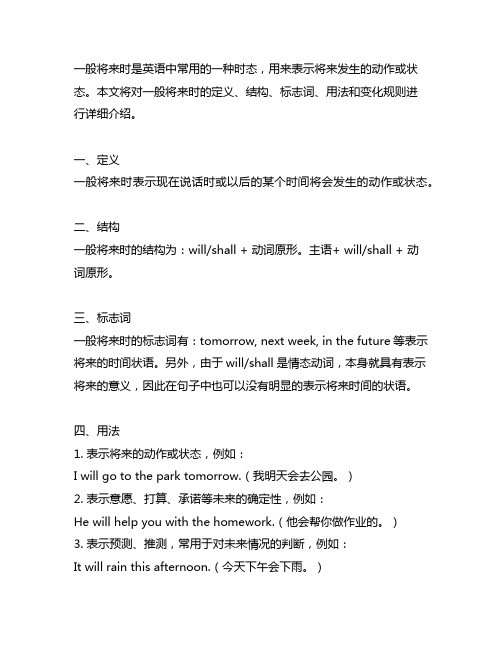
一般将来时是英语中常用的一种时态,用来表示将来发生的动作或状态。
本文将对一般将来时的定义、结构、标志词、用法和变化规则进行详细介绍。
一、定义一般将来时表示现在说话时或以后的某个时间将会发生的动作或状态。
二、结构一般将来时的结构为:will/shall + 动词原形。
主语+ will/shall + 动词原形。
三、标志词一般将来时的标志词有:tomorrow, next week, in the future等表示将来的时间状语。
另外,由于will/shall是情态动词,本身就具有表示将来的意义,因此在句子中也可以没有明显的表示将来时间的状语。
四、用法1. 表示将来的动作或状态,例如:I will go to the park tomorrow.(我明天会去公园。
)2. 表示意愿、打算、承诺等未来的确定性,例如:He will help you with the homework.(他会帮你做作业的。
)3. 表示预测、推测,常用于对未来情况的判断,例如:It will rain this afternoon.(今天下午会下雨。
)五、变化规则1. 肯定句的一般将来时结构为:will/shall + 动词原形。
例如:She wille to see me tomorrow.(她明天会来看我。
)2. 否定句的一般将来时结构为:will/shall + not + 动词原形。
例如:I will not go to the party tonight.(我今晚不会去参加派对。
)3. 疑问句的一般将来时结构为:will/shall + 主语+ 动词原形。
例如:Will youe to the meeting tomorrow?(你明天会来参加会议吗?)以上就是关于一般将来时的定义、结构、标志词、用法和变化规则的详细介绍。
希望对您有所帮助。
一般将来时是英语中最常用的一种时态之一,用于表示将来会发生的动作或状态。
一般将来时的6种表达方式
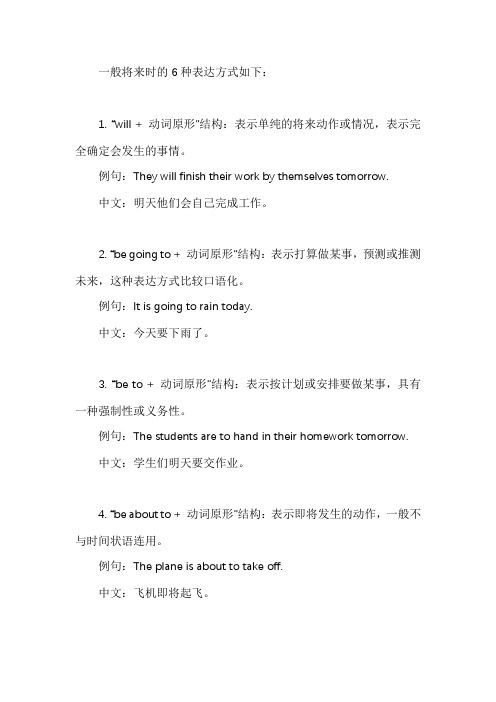
一般将来时的6种表达方式如下:
1. “will + 动词原形”结构:表示单纯的将来动作或情况,表示完全确定会发生的事情。
例句:They will finish their work by themselves tomorrow.
中文:明天他们会自己完成工作。
2. “be going to + 动词原形”结构:表示打算做某事,预测或推测未来,这种表达方式比较口语化。
例句:It is going to rain today.
中文:今天要下雨了。
3. “be to + 动词原形”结构:表示按计划或安排要做某事,具有一种强制性或义务性。
例句:The students are to hand in their homework tomorrow.
中文:学生们明天要交作业。
4. “be about to + 动词原形”结构:表示即将发生的动作,一般不与时间状语连用。
例句:The plane is about to take off.
中文:飞机即将起飞。
5. “be able to + 动词原形”结构:表示具有做某事的能力或可能性,通常用于现在时态。
例句:She is able to speak English fluently now.
中文:现在她能够流利地说英语了。
6. “be apt to + 动词原形”结构:表示具有某种倾向或易于发生某事,强调预测性。
例句:He is apt to forget his keys.
中文:他容易忘记带钥匙。
一般将来时
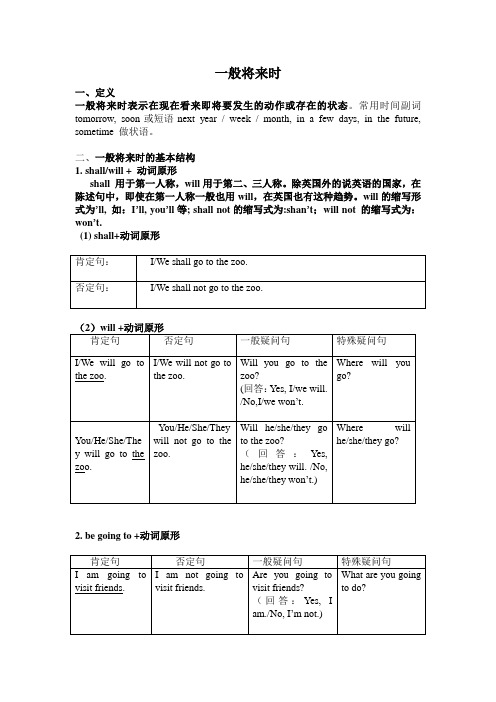
一般将来时一、定义一般将来时表示在现在看来即将要发生的动作或存在的状态。
常用时间副词tomorrow, soon或短语next year / week / month, in a few days, in the future, sometime 做状语。
二、一般将来时的基本结构1.shall/will + 动词原形shall 用于第一人称,will用于第二、三人称。
除英国外的说英语的国家,在陈述句中,即使在第一人称一般也用will,在英国也有这种趋势。
will的缩写形式为’ll, 如:I’ll, you’ll等; shall not的缩写式为:shan’t;will not 的缩写式为:won’t.(1) shall+动词原形肯定句:I/We shall go to the zoo.否定句:I/We shall not go to the zoo.(2)will +动词原形肯定句否定句一般疑问句特殊疑问句I/We will go to the zoo. I/We will not go tothe zoo.Will you go to thezoo?(回答:Yes, I/we will./No,I/we won’t.Where will yougo?You/He/She/The y will go to the zoo.You/He/She/Theywill not go to thezoo.Will he/she/they goto the zoo?(回答:Yes,he/she/they will. /No,he/she/they won’t.)Where willhe/she/they go?2. be going to +动词原形肯定句否定句一般疑问句特殊疑问句I am going to visit friends. I am not going tovisit friends.Are you going tovisit friends?(回答:Yes, Iam./No, I’m not.)What are you goingto do?He/She is going to visit friends. He/She is not goingto visit friends.Is he/she going tovisit friends?(回答:Yes, he/sheis./No,he/she isn’t.)What is he/shegoing to do?We/You/They are going to visit friends. We/You/They are notgoing to visit friends.Are you/they goingto visit friends?(回答:Yes, we/theyare./No,we/theydon’t.)What are you/theygoing to do?三、一般将来时的基本用法1.表示单纯的将来事实,由“will / shall + 动词原形”构成。
一般将来时2
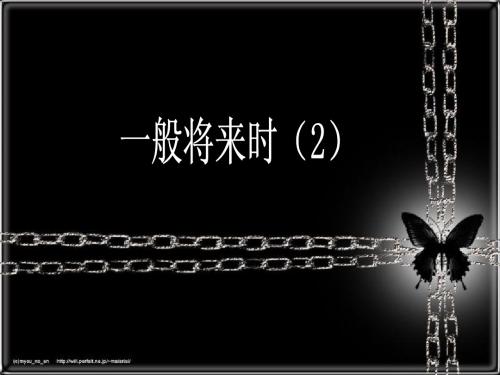
主语,will和动词,否定will加not. 一般疑问will在前,I/we 变you加问号。
e.g. 1.I will do some reading tomorrow. Will you do any reading tomorrow? Yes, I will. 2.He/She will have a lesson next week. Will she have a lesson next week? Yes, she will. 3. We'll get up at 6:30 tomorrow. Will you get up at 6:30 tomorrow? Yes, we will.
一般将来时
1.定义:一般将来时表示在将来时间将要发生的动作。
2.时间标志:tomorrow, next day (week, month,
year„), this week/year/mornng/afternoon.
肯定句:主语+will+动词/动词短语. 表示对未来的预测,建议,或作出决定。
We/He/She will=We/He/She'll
year„), this week/year/mornng/afternoon.
肯定句:主语+will+动词/动词短语. 表示对未来的预测,建议,或作出决定。
We/He/She will=We/He/She'll
will 没有人称的变化
一般将来时
否定句:主语+will not+动词/动词
短语.
will not= won't
I will take a trip in ShangHai. She'll go to Beijing next week.
一般将来时例句
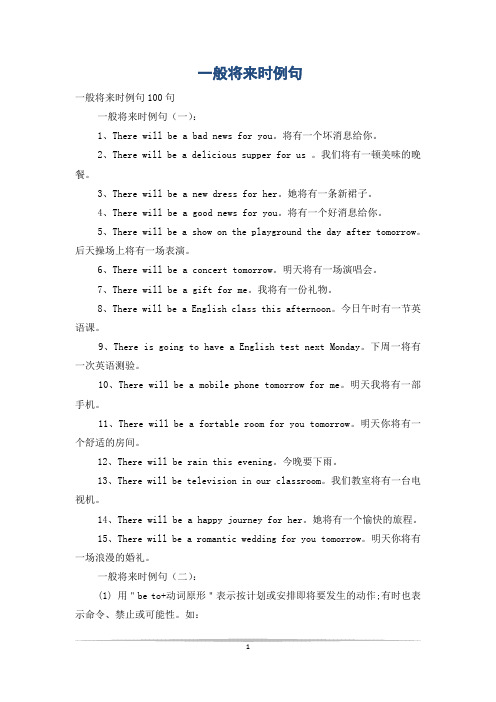
一般将来时例句一般将来时例句100句一般将来时例句(一):1、There will be a bad news for you。
将有一个坏消息给你。
2、There will be a delicious supper for us 。
我们将有一顿美味的晚餐。
3、There will be a new dress for her。
她将有一条新裙子。
4、There will be a good news for you。
将有一个好消息给你。
5、There will be a show on the playground the day after tomorrow。
后天操场上将有一场表演。
6、There will be a concert tomorrow。
明天将有一场演唱会。
7、There will be a gift for me。
我将有一份礼物。
8、There will be a English class this afternoon。
今日午时有一节英语课。
9、There is going to have a English test next Monday。
下周一将有一次英语测验。
10、There will be a mobile phone tomorrow for me。
明天我将有一部手机。
11、There will be a fortable room for you tomorrow。
明天你将有一个舒适的房间。
12、There will be rain this evening。
今晚要下雨。
13、There will be television in our classroom。
我们教室将有一台电视机。
14、There will be a happy journey for her。
她将有一个愉快的旅程。
15、There will be a romantic wedding for you tomorrow。
一般将来时 (2)
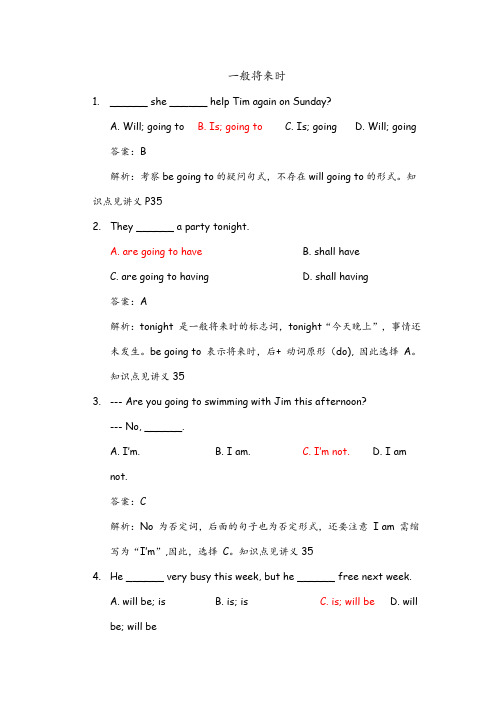
一般将来时1.______ she ______ help Tim again on Sunday?A. Will; going toB. Is; going toC. Is; goingD. Will; going答案:B解析:考察be going to的疑问句式,不存在will going to的形式。
知识点见讲义P352.They ______ a party tonight.A. are going to haveB. shall haveC. are going to havingD. shall having答案:A解析:tonight是一般将来时的标志词,tonight“今天晚上”,事情还未发生。
be going to 表示将来时,后+ 动词原形(do), 因此选择A。
知识点见讲义353.--- Are you going to swimming with Jim this afternoon?--- No, ______.A.I’m.B. I am.C. I’m not.D. I amnot.答案:C解析:No 为否定词,后面的句子也为否定形式,还要注意I am 需缩写为“I’m”,因此,选择C。
知识点见讲义354.He ______ very busy this week, but he ______ free next week.A.will be; isB. is; isC. is; will beD. will be;will be答案:C解析:this week是一般现在时的标志词,next week 为将来时标志词。
因此,选择C。
知识点见讲义375.There ______ a concert in our school the week after next.A.is going to beB. will haveC. beD. is goingto have答案:A解析:由”the week after next”可推断出一般将来时,There be句型表示”有...”。
一般将来时动词变化规则

一般将来时动词变化规则一般将来时是用来表示将来某个时间要发生的动作或存在的状态。
在英语中,一般将来时的动词变化规则如下:1. 第一人称和第三人称单数形式的一般将来时动词通常是动词的原形,后面可以加上助动词"will"或"shall"。
例如:I will go to the party tomorrow.(我明天要去参加派对。
)2. 第二人称和第三人称复数形式的一般将来时动词通常是动词的原形,后面需要加上助动词"will"。
例如:You will have a great time at the concert.(你们将会在音乐会上度过愉快的时光。
)3. 在一般将来时中,否定句需要在助动词"will"后面加上"not"。
例如:He will not come to the meeting.(他不会来参加会议。
)4. 一般将来时的疑问句需要将助动词"will"提到句子的主语之前。
例如:Will they finish the project on time?(他们能按时完成这个项目吗?)5. 一般将来时的疑问句可以用疑问词(如who, what, when, where, why, how等)加上助动词"will"来构成疑问句。
例如:What will you do this weekend?(这个周末你将做什么?)6. 在一般将来时中,可以使用其他一些词语来表示将来,如:"begoing to"和"shall"。
例如:She is going to visit her grandparents next week.(下周她将去看望她的祖父母。
)7. 一般将来时中的时间状语可以使用一些表示将来的词语,如:"tomorrow", "next week", "in the future"等。
- 1、下载文档前请自行甄别文档内容的完整性,平台不提供额外的编辑、内容补充、找答案等附加服务。
- 2、"仅部分预览"的文档,不可在线预览部分如存在完整性等问题,可反馈申请退款(可完整预览的文档不适用该条件!)。
- 3、如文档侵犯您的权益,请联系客服反馈,我们会尽快为您处理(人工客服工作时间:9:00-18:30)。
一般将来时2(2011-12-24)一般将来时的用法1.表示在将来某个时间要发生的动作或存在的状态I shall write you a letter next month.We won’t be free tonight.2.表示经常或反复发生的动作From now on I will do morning exercises every day.He will come and help me with my English every Sunday morning.3.现在进行时表将来:有些动词(如:come, begin, start, arrive, leave,stay…)等动词的现在进行时,可表示将要发生的动作。
如:His father is coming back from Beijing.She is arriving in Wuhan tonight.She is going there tomorrow.口诀简单记忆:来去到达待,开始居住起飞就离开。
(come, go, arrive, stay, begin/start, live, take off/fly, leave)例题:The summer vacation will begin next week. David to stay with us.A. will be comingB. comesC.cameD. is coming4.一般现在时表将来:当主句为一般将来时态,在if, as soon as, when,等引导的状语从句中,用一般现在时代替一般将来时。
(简单记忆:主将从现)如:If it doesn’t rain this afternoon, We will have a football match.例题:1.Li Ming will give us a call as soon as he in Sichuan.A. is arrivingB. will arriveC. arrivedD. arrived2. If you to the 2010 Shanghai Expo next month, I will go with you.A. goB. has goneC. will goD. are going3. If it tomorrow, we will stay at home. We won’t go to the museum.A. rainB. rainsC. will rainD.rained4.---- The TV Show Home With Kids is so wonderful. You shouldn’t miss it.---- If I have time, I it.A. seeB. sawC. will seeD. have see课堂练习一、用所给单词的适当形式填空1、There _________(be) a meeting tomorrow morning.2、We ___________(play) with snow if it snows this afternoon.3、He ____________(help) you with your English as soon as he isfree.4、_____you _______(learn) Japanese next year?5、______your father ______(be) back soon ?二、按照要求改写下面的句子:1.He is going to move to America.(对划线部分提问)_________is he _________ ________ __________ ?2. Mike is going to play soccer next Friday .(对划线部分提问)__________ __________ Mike _________ to play soccer?3.Yoyo is going to be an actress when she grows up. (改为否定句)______________________________________________________三.单项选择:1 _____you ____a doctor when you grow up?A Will; going to beB Are; going to beC Are; /D Will; /2 I think he _____ if it doesn’t rain.A will come B. comes C. coming D. came3 He will be back _____a few minutes.A withB forC onD in4 What time _____we meet at the gate tomorrow?A willB shallC doD are5 He will have a holiday as soon as he _____the work next week.A finishesB doesn’t finishC will finishD won’t finish四、阅读理解The sun is always shining. But it can only shine on one side of the earth at one time. When the sun is shining on one side of the earth, it is night on the other side.At night, you can see the stars(星星). The stars are in the sky all day. But the light from the sun is so bright that you can’t see them. When night come, there is no light, and the stars are bright enough to see. The stars look very small. But some of them are even bigger than the sun. They look small because they are so far away from you. Big things look much smaller when they are far away. The sun is closer(近)to the earth than other stars, so it looks bigger.1.When it is night, the sun ________ .A. doe sn’t shineB. shines for a short timeC. disappears(消失)D. shines on the other side of the earth2.We can’t see the stars in the sky at daytime(白天)because ________ .A. there are no stars thereB. the stars are much smaller than the sunC. the bright light from the sun makes them not seen (被看见)D. the stars come out only at night3.The stars look small because ________ .A. they are far awayB. they are smallC. they have no lightD. they are in the sky4. Small things may look ________ when they are close.A. biggerB. smallC. nearD. far away5.The sun looks bigger than other stars because ________ .A. it’s biggerB. it’s far away in the skyC. it gives much bright lightD. it’s closer to the earth than other stars课堂练习一、用所给词的正确形式填空:1. There (be) a meeting tomorrow morning.2.We (play) with snow if it snows this afternoon.3. He (help) you with your English as soon as he is free.4. you (learn) Japanese next year.5. your father (be) back soon?6.Look at the clouds. It (rain).It often (rain) in summer.7.。
